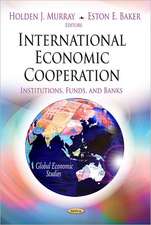Financial Globalization
Editat de Jason H. Cardwellen Limba Engleză Paperback – 30 iun 2010
Preț: 472.28 lei
Preț vechi: 647.56 lei
-27% Nou
Puncte Express: 708
Preț estimativ în valută:
90.37€ • 96.64$ • 75.35£
90.37€ • 96.64$ • 75.35£
Carte disponibilă
Livrare economică 27 martie-10 aprilie
Preluare comenzi: 021 569.72.76
Specificații
ISBN-13: 9781606921906
ISBN-10: 1606921908
Pagini: 75
Ilustrații: tables, graphs
Dimensiuni: 152 x 228 x 6 mm
Greutate: 0.15 kg
Editura: Nova Science Publishers Inc
ISBN-10: 1606921908
Pagini: 75
Ilustrații: tables, graphs
Dimensiuni: 152 x 228 x 6 mm
Greutate: 0.15 kg
Editura: Nova Science Publishers Inc
Cuprins
Preface; Globalization & Inflation Dynamics: The Impact of Increased Competition; Financial Globalization & the U.S. Current Account Deficit; Foreign Holdings of U.S. Government Securities & the U.S. Current Account; Index.















